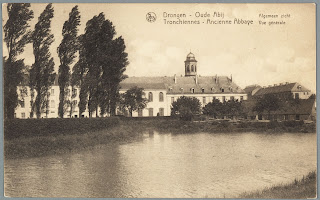Early in the morning between winter and spring, when the grass is frosty, when there is no scent and no sound but a heavy white stillness, and yet you know the blackbird may speak at any moment, a sharp sweet waterfall of sound fall down, and the earth wake – on such a morning the milkman whistles “Auprès ma blonde” as he drives down the little alley behind the houses on Boulevard Léopold.
The poet at the narrative heart of the novel is based on a mentor of Sarton’s, someone who taught her in the mid 1920’s when Sarton was twelve years old and a student at the Institut Belge de Culture Française in a suburb outside Brussels.
When a writer knows where she is going, when she uses sentence structures that show an awareness of the complexity of situations, when she employs words that are not the simple or obvious ones – doing so in the service of something that is not simple or obvious – I am snared. I follow her.
Many readers of May Sarton do. We become a following. We are linked by a feeling of shared allegiance to that solitary life and the words that got written when no one else was around. In a way, we own ourselves heirs of her quiet hours.
Recently in my own quiet hours I have turned to a Belgian author whose books would have been available in specialized bookstores in Brussels in the mid-1920s. Pierre Charles, S.J., and his writings are familiar from my seminary days. I do not imagine either the twelve-year-old Sarton or her poet/teacher Marie Closset being drawn to a book of meditations by a young professor of theology who then lived an hour away in the university town of Louvain.
In time La Prière de toutes les heures (1923) would be translated into nine languages. The custom of collecting a series of short meditations – each three or four pages long – and publishing them was not new when Pierre Charles was ordained a priest in 1910. A number of such collections would have been available in the seminary library in Tronchiennes where Pierre Charles had completed his two-year novitiate in 1901 and where he had spent a final year of spiritual formation after ordination.
Perhaps the skill of creatively inviting a listener into a Gospel text was one that Pierre Charles early recognized as his own. An individual making a retreat led by the young priest or attending a Sunday Mass where he had preached may have asked for copies of his words. What evidently had the power of helping people think about their lives might have seemed worth sharing with a larger audience.
When a writer knows where he is going, when he uses sentence structures that show an awareness of the complexity of situations, when he employs words that are not the simple or obvious ones – doing so in the service of something that is not simple or obvious – I am snared. I follow him.
I do not know that many other readers do. A hundred years after their publication, I do not realistically expect that there is a following for his writings. I look at old black-and-white postcards of the seminary at Tronchiennes and imagine a young Pierre Charles along its paths and in its chapels, wondering to himself what his life will be like, wondering what the rest of the twentieth century will be like. My allegiance to that solitary life and the words that got written when no one else was around may have to remain itself a fairly solitary thing.
I do not regret owning myself the heir of another man’s quiet hours.




2 comments:
Aujourd'hui en France , journée nationale contre le diabète qui touche ici 3 millions de personnes .
J'espère que vous continuez les bonnes résolutions des semaines dernières ; mais marcher à 6 heures du matin ...ce doit être difficile avec le temps qui a rafraichi.
Amitiés . Jo d'Avignon
Pauvre Paris! Pauvre France!
Post a Comment